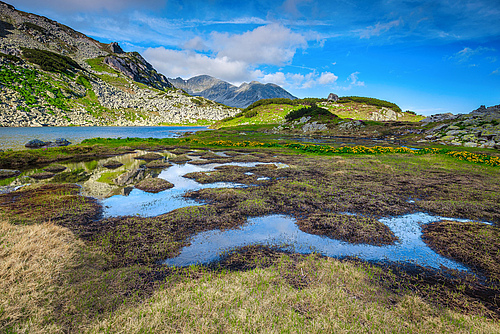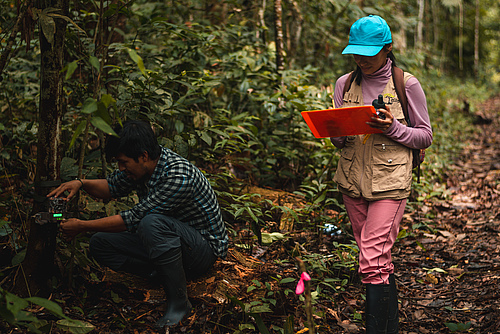News

Study identifies policy needs, challenges, and future pathways. › more

Report by Jose Valdez, postdoctoral researcher of Biodiversity Conservation at iDiv and Martin Luther University Halle-Wittenberg (MLU) Despite hosting some of the world's most biodiverse ecosystems… › more

Largest modelling study of its kind, published in Science › more

Researchers at iDiv propose a new strategy for rewilding amphibians in a recent study. › more

One-third of Africa’s great ape population faces risks related to mining › more

Ecologist Prof Henrique Pereira is part of the ECB's Motifs Advisory Group, which proposes motifs for the next generation of euro banknotes. › more

Survey shows positive attitudes towards rewilding in the Oder Delta region, but finds locals’ feelings are mixed. › more

A new approach to co-designing biodiversity indicators › more

Species observations have unveiled a potentially universal pattern › more

NaturaConnect Stakeholder Event in Brussels brings over 70 leading EU policy and governmental decision-makers › more

Study finds that current monitoring data may be far too incomplete and deficient to provide a precise global picture of local biodiversity richness trends › more

European project started to assess ecological restoration through rewilding › more

Report by Dr. Sandeep Sharma, Researcher of the Biodiversity Conservation research group at iDiv and MLU, and lead author of a new publication in Ecology and Evolution › more

Report by Dr Corey Callaghan, Assistant Professor at University of Florida, formally postdoctoral researcher at iDiv and Martin Luther University Halle-Wittenberg › more

International project NaturaConnect brings together the knowledge on how to protect biodiversity in Europe › more

Recent expansions mean little more than a stabilisation of the species › more

New research offers a pathway to achieving the 30 by 30 target using ecosystem diversity across four South American countries › more

Report by Dr Jose Valdez, Postdoctoral Researcher of the Biodiversity Conservation research group at iDiv and Leipzig University, and senior author of a new publication in Frontiers in Ecology and… › more

Researchers recommend urban conservation gardening measures to reverse horticultural trends › more

Reptiles likely benefit from efforts to save other animals › more

Based on a press release by the Martin Luther University Halle-Wittenberg (MLU) National biodiversity monitoring programmes in Europe face many challenges: too little coordination, inadequate… › more
![Collage of plant species that are range-restricted to Europe but threatened in at least one country, with some of them being globally threatened. (Picture: Vlaev, Dimiter in Peev, D. et al. (eds) (2015): Red Data Book of the Republic of Bulgaria. Vol. 1. Collage of plant species that are range-restricted to Europe but threatened in at least one country, with some of them being globally threatened. (Picture: Vlaev, Dimiter in Peev, D. et al. (eds) (2015): Red Data Book of the Republic of Bulgaria. Vol. 1. Plants and Fungi. MoEW & BAS, Sofia [Single inset drawings; compiled by Staude, I.]. http://e-ecodb.bas.bg/rdb/en/)](/fileadmin/_processed_/3/a/csm_pic_f98b3b0e6520220210143620_7ab832576e.jpg)
Study closes gaps in the risk of extinction of plant species › more

BMBF research project starts in the Oder Delta model area › more

New study shows: Europe's grasslands, forests and mountain summits are becoming increasingly similar in species composition › more

Scientists propose framework for national-level implementation of global biodiversity goals › more

Traffic probably poses one of the greatest risks to animal populations. However, we currently know very little about this issue. › more

Scientists have developed a new way of evaluating rewilding progress › more

Researchers record adaptability of 158 butterfly species to urbanisation › more

How to measure biodiversity using satellites › more

Ensuring sustainability of crop and timber production would mitigate the greatest drivers of terrestrial wildlife decline › more

Biodiversity doesn’t feature enough in large-scale assessments of ecosystem services › more

Researchers propose necessary corrections in global biodiversity policy › more

Information system on Europe’s biodiversity and ecosystems for policy makers › more

New publication in Science with iDiv contribution › more

Evidence-based conservation is key to curb primate population declines › more

A comment by Prof Dr Henrique Pereira › more

More nitrogen in the soil: common plant species on the rise › more

Scientists and NGOs present policy papers. › more

The rewilding of European ecosystems can help to tackle both the current climate and biodiversity emergencies. › more

Researchers assess direct and indirect effects of urban growth on a global scale. › more

Where people’s needs for nature are greatest, nature’s ability to meet those needs is declining › more

Restoration success depends on regeneration potentials › more

New puzzle piece in scientific debate › more

Research team evaluates global biodiversity data – with surprising resultsLeipzig. After conducting comprehensive studies, an international team of researchers led by Leipzig University and the iDiv… › more

Developed under the auspices of the Group on Earth Observations Biodiversity Observation Network (GEO BON) › more

Population and economic growth offset improvement of environmental balance of land use › more

Wide range of activities of iDiv scientists › more

Area of habitat larger than New Zealand could be lost to urbanisation over next 20 years › more

Two new iDiv publications take a closer look at rewilding. › more

How trait variability within species can be incorporated in Essential Biodiversity Variables (EBVs). › more

